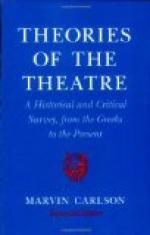VIII
THE MODERN SOCIAL DRAMA
The modern social drama—or the problem play, as it is popularly called—did not come into existence till the fourth decade of the nineteenth century; but in less than eighty years it has shown itself to be the fittest expression in dramaturgic terms of the spirit of the present age; and it is therefore being written, to the exclusion of almost every other type, by nearly all the contemporary dramatists of international importance. This type of drama, currently prevailing, is being continually impugned by a certain set of critics, and by another set continually defended. In especial, the morality of the modern social drama has been a theme for bitter conflict; and critics have been so busy calling Ibsen a corrupter of the mind or a great ethical teacher that they have not found leisure to consider the more general and less contentious questions of what the modern social drama really is, and of precisely on what ground its morality should be determined. It may be profitable, therefore, to stand aloof from such discussion for a moment, in order to inquire calmly what it is all about.
I
Although the modern social drama is sometimes comic in its mood—The Gay Lord Quex, for instance—its main development has been upon the serious side; and it may be criticised most clearly as a modern type of tragedy. In order, therefore, to understand its essential qualities, we must first consider somewhat carefully the nature of tragedy in general. The theme of all drama is, of course, a struggle of human wills; and the special theme of tragic drama is a struggle necessarily foredoomed to failure because the individual human will is pitted against opposing forces stronger than itself. Tragedy presents the spectacle of a human being shattering himself against insuperable obstacles. Thereby it awakens pity, because the hero cannot win, and terror, because the forces arrayed against him cannot lose.
If we rapidly review the history of tragedy, we shall see that three types, and only three, have thus far been devised; and these types are to be distinguished according to the nature of the forces set in opposition to the wills of the characters. In other words, the dramatic imagination of all humanity has thus far been able to conceive only three types of struggle which are necessarily foredoomed to failure,—only three different varieties of forces so strong as to defeat inevitably any individual human being who comes into conflict with them. The first of these types was discovered by Aeschylus and perfected by Sophocles; the second was discovered by Christopher Marlowe and perfected by Shakespeare; and the third was discovered by Victor Hugo and perfected by Ibsen.




